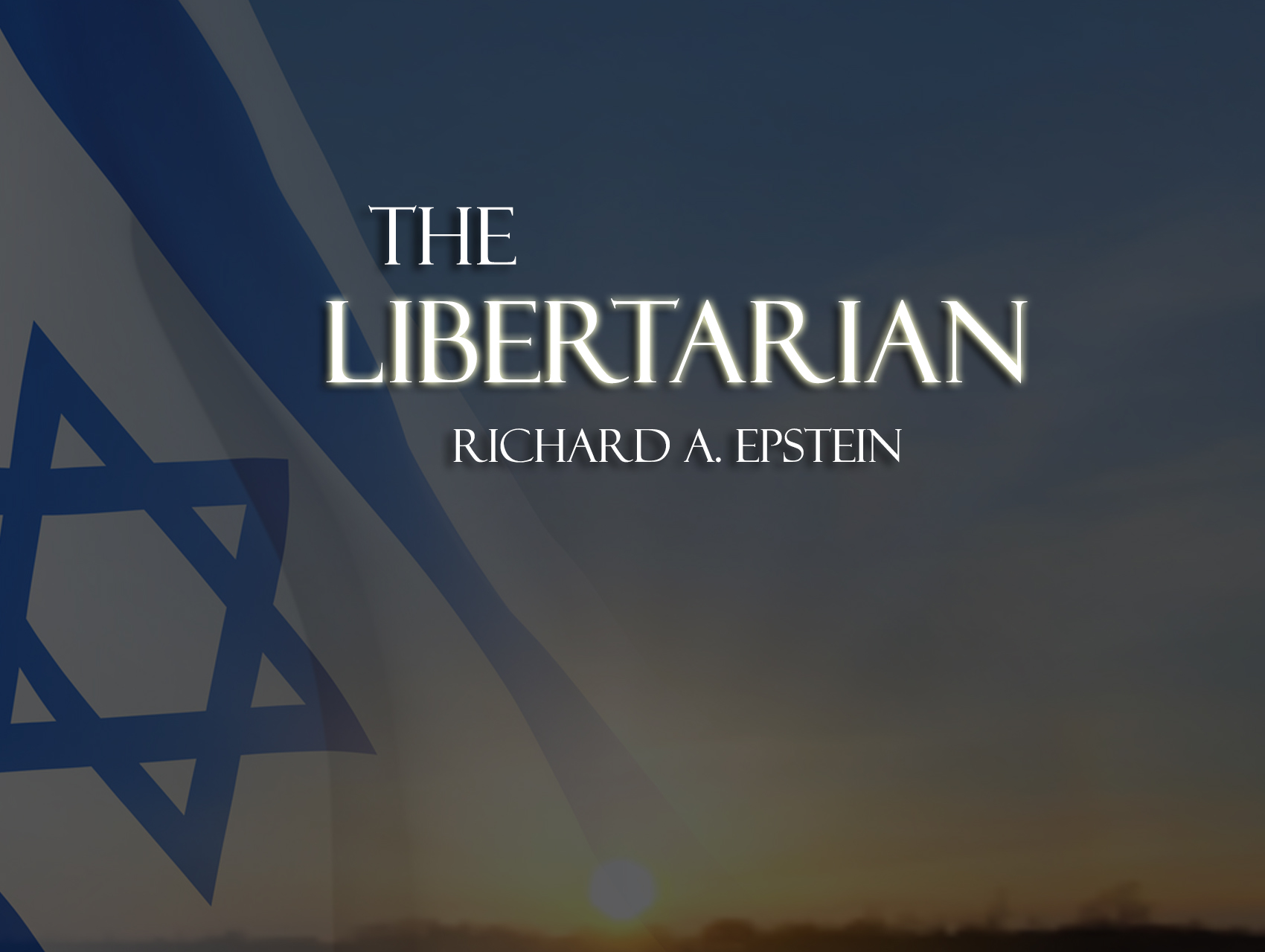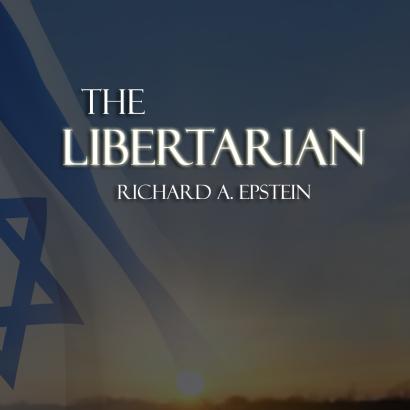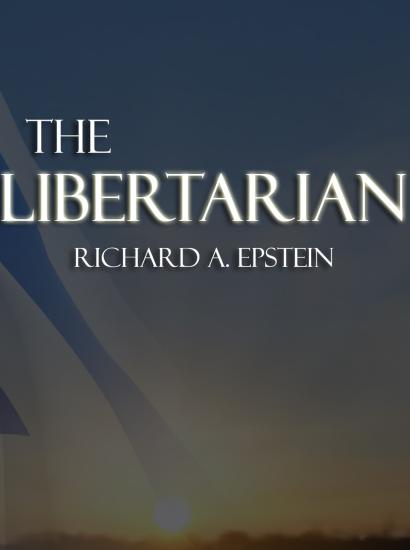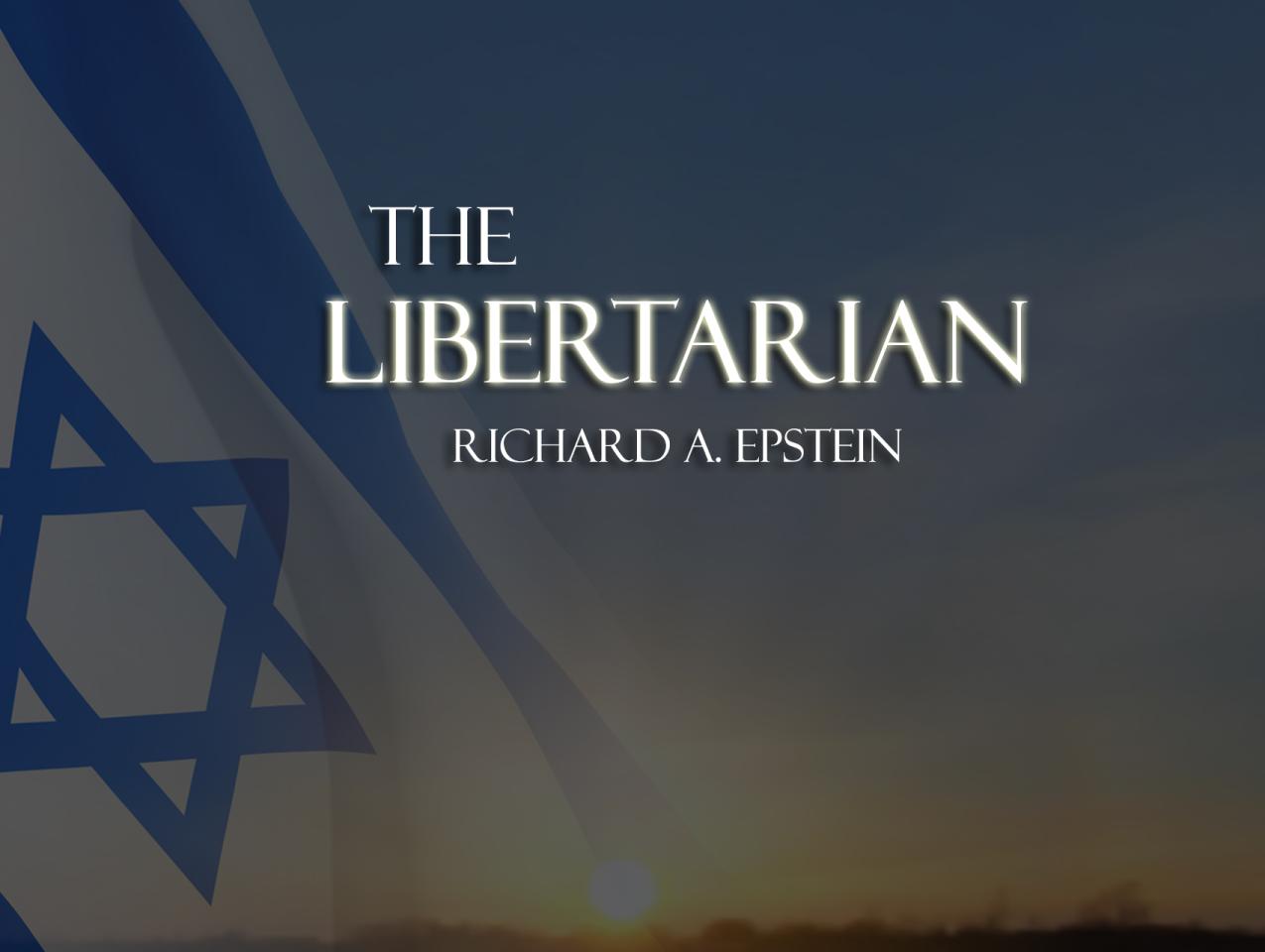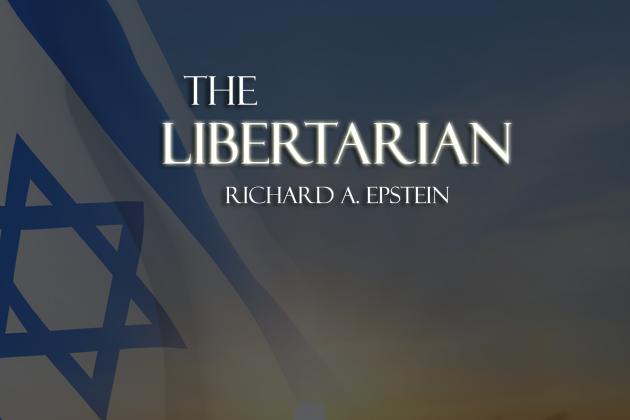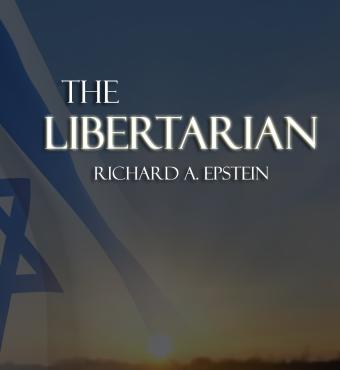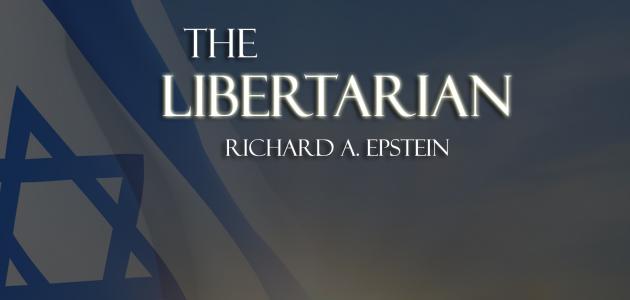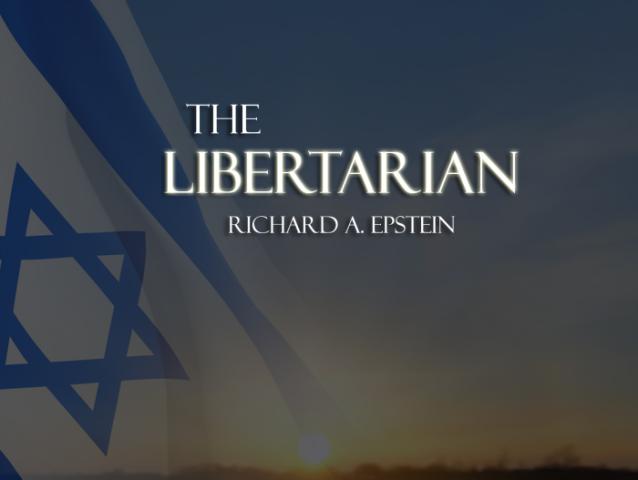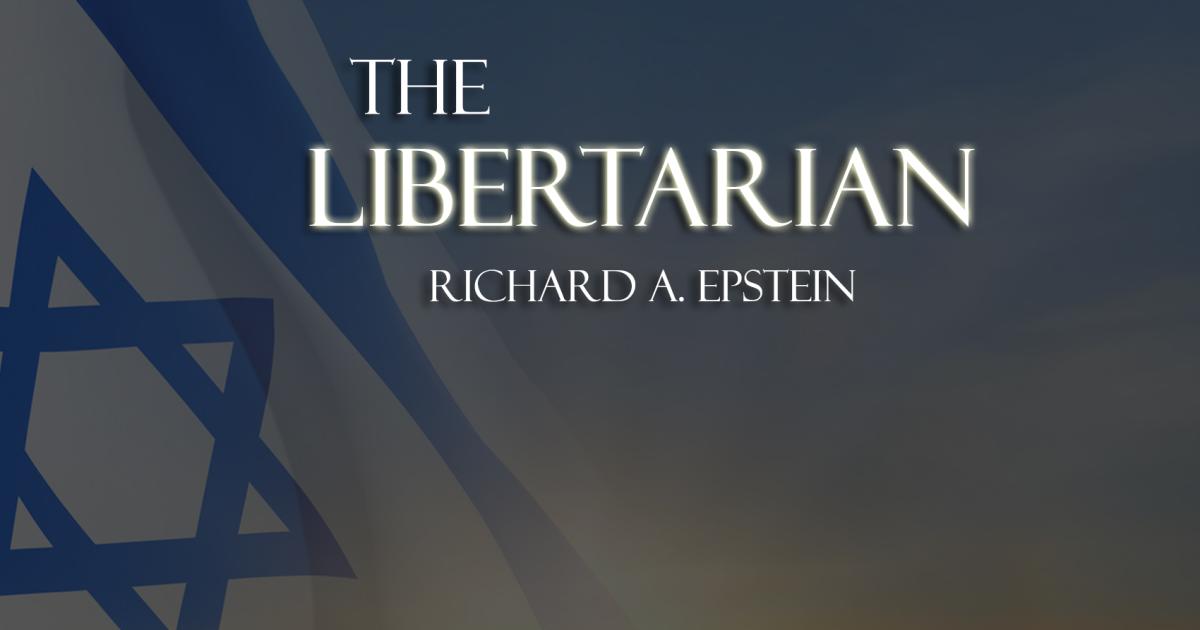Richard Epstein responds to the argument that Hamas’s actions were justified because Israel is a colonizer, an occupier, and an apartheid state.
>> Tom Church: This is The Libertarian podcast from the Hoover Institution. I'm your host, Tom Church, and I'm joined, as always, by the libertarian professor Richard Epstein. Here at Hoover, Richard is the Peter and Kirsten Bedford Senior Fellow. He's also the Laurence A Tisch Professor of Law at NYU, and he is a senior lecturer at the University of Chicago.
Richard, let's get right into it. We're still talking about Israel and Hamas, not just because there is a large ground offensive coming up, hasn't commenced yet, but it looks like the IDF will be going into Gaza very soon, but because there are, I think, continued protests and media coverage that baffle the mind, baffle my mind, at least, with looking at these protesters, their appreciation or support of Hamas and its targeting of civilians and its methods of attack and their, like I said, receiving a lot of media coverage.
And you wrote something which I appreciate, which is that the struggle here in Gaza is as much about words as it is about hostages, guns and rockets. And that's because there is political will that needs to happen for, I guess, continued action or for Israel to accomplish its goal of rooting out Hamas entirely.
Now, Richard, there are many claims about Israel and about its behavior that I'd like to get some responses from you on because there are allegations or I guess, pro, I don't want to say pro Hamas supporters because it really is pro palestinian people who I think, unfortunately, end up on the side of Hamas because that's their side, but they make allegations.
So I'd like to make a couple of them to you and have you give me your responses.
>> Richard A. Epstein: Sure.
>> Tom Church: Yeah, the first one I often hear is that this action is justified because Israel is a colonizer or a colonial nation. And I hear that, I think, mostly justified because of not even in Gaza, but in the West bank because of continued expansion or support for settlements there.
So how am I to understand or to answer allegations that Israel is their colonizers?
>> Richard A. Epstein: And the way in which you start to think of a colonized nation is somebody comes in from the outside and takes over a particular place, even though they have no long term or indigenous presence there.
But the Israeli or the Jewish presence going back into Palestine goes back a very long time. I could still remember 1988 when I went on a tour there. They took me to a particular room, and at the bottom of the room there were all the Jewish artifacts and designs.
In the middle, it turned out there were the Christian designs, and on top there were the Muslim design. And so what you do is you see vertically three different groups claiming ownership of the particular place. And, well, if the rule is prior in time is higher and right, the guy on the bottom presumably has the largest claim.
It gets extremely complicated, because what happens is, these nations ebb and flow, and these groups go in and out with respect to each other. But there has been a very long Israeli presence, or Jewish presence in this particular area. So, for example, the Hebrew University that is built on Mt Scopus was founded in 1925.
And at the time, when relationships were a little bit better, there were pretty good relationships between the Arabs who attended the particular foundation, the foundation of the college or the university, and the jewish people there. So things have always gone hot and cold. On the other hand, there was a large jewish community in Hebron, and what happened is there was a massive attack and a pogrom that took place, leaving over 100 people dead in 1929.
And nobody could have attributed that to the fact that there was an israeli nation putting boycotts in one place or another. So the history is extremely complicated. There was, of course, no state of Palestine. What had happened was the entire area had been taken over by the Ottomans.
And at the end of the World War I, they were forced out. And so a British mandate was imposed on the particular region. It was called Palestine by the Romans, but in fact, there was no particular Palestinian entity there. There were clashing instances between Jews and Palestinians. And in 1947, the British pulled out and there was a UN resolution, which says that we see claims from both sides here.
We're pretty confident they will not be able to live together. And so they tried to do a partition. Partitions sort of work when you have India and Pakistan, and much less stable when you have ragged borders and various tiny takers. And so what happens is, the Jewish people accepted this and called their state Israel.
And the day after this thing was announced, six Arab armies start to invade the country with the express purpose of trying to alienate and destroy all Jewish interests in this case. And much to everybody's amazement, the Jewish forces actually beat them and expanded their territories, until we got to the 1949 armistice, which is not quite the current borders, but roughly so.
It should be important to understand that by 1948, when this happened, Gaza was a province in Egypt. It was not an independent country. And then there was a mass migration of people, Palestinians, out from many of the areas into Gaza. So it became an occupied kind of territory administered by the Egyptians.
There is a huge dispute as to whether they were driven out or whether or not they were told by their arab leaders to leave. I think the truth probably lies somewhere in the middle, that there was some people who were asked to leave by the Jews. And there's some people asked to leave by the Arabs.
I do remember there was this book about the promised land where a large number of Arabs in this war were put into a church. And they all thought that they would be murdered because that's what they would have done if they had taken control of the Jewish people and they were told to leave.
So it's completely chaotic. 1949 comes, the armistice comes into de facto territory. Gaza at this point is still under the administration of the Egyptians. And one of the things that became very clear then and later is the Egyptians and all Arab nations made a very constant decision not to allow anybody from Gaza who was Palestinian to resettle in any other Arab land.
And at the same time, Jewish people were not only coming in from Europe, but they were driven out of places like Iraq and Morocco and Egypt and so forth because their lives were in peril and they were constantly going to be shot or killed. So you see a Jewish influx coming, some from Europe, some from these other places.
And you ask yourself, well, do the Jews have a right to return to Iraq? I think you know the answer is they may have the right to return to a place that will find themselves dead in very short order. And so what most people would do is that the deck has been reshuffled.
Let's keep on that. And then it comes basically to 1956. And what happens is that Gamal Abdel Nasser, what he decides to do is to shut the Suez canal. This is obviously an act of war, to the extent that it disrupts shipping that would otherwise go through the canal would now have to go around.
The French and British and the Israelis, basically, then mounted a strong attack. And what happened is Nasser was forced back, and the Israelis took over the Sinai. But they returned the Sinai afterwards, even though people knew that there was likely to be oil or something of value there.
So what you do is you have another attack. And the line that I've always said is, if you're trying to exterminate somebody and you lose, and what happens is you go back to the antecedent borders, then, in effect, you get as many shots as you can. And if you win on one of them, it will never reverse.
So the Jews essentially have always had to take the position. There are certain kinds of attacks. And afterwards we will try to fortify our borders to make sure that there is no repetition. So what you did is you had the Hebrew University on the top of Mount Scopus.
And there used to be a single path going up there before the 67 war was over. Afterwards, it turns out it becomes a bigger place. So you have more defense. Several times the Israelis had to scale the Golan Heights in order to fight back the Syrians. And what they did is they decided to stay there because they didn't want to have mass murder and guns raining down on them.
And it was relatively easy because it was not occupied territory by anybody on the Syrian side. So essentially you just kept it as a barrier. So this thing is an elaborate compromise. You have all the difficulty taking place inside Lebanon, a highly unstable country. In 1943, it was half christian and half muslim.
And they had a very unstable system of divided powers between the two. By 1958, the muslim population had grown and the christian population had shrunk. And you had these huge internal struggles and breakdowns in the country. And by the time we go today, it's massively unstable. There was a real danger to Israel from 1982 of coming in like Hezbollah today.
And now the country is basically divided in two. And the southern portion is controlled by a very militant group who's receiving active and continuous support from the Iranian. And so the question on the jewish side is what you do to combat that. They went in there. It wasn't the correct kind of move in many ways.
But what you do is, you see, always responses to real provocations. Because in the end of the day, if you take the maxim which is from the river to the sea, it's very clear what is left unstated, but what is nonetheless intended, namely that when we take over this place, just look at the map, you will see a map of greater Palestine which contains all of current Israel, all the west bank and so forth.
And the theory will be that when this is done, all the Jews will have the choice of either being killed or of leaving. It does not seem that there's any place for any kind of a situation. The idea that you even turn back to the fragile situation between 1947 is just not part of the situation.
So if you're an israeli and you start seeing all this, you then figure out what you do. And it's very hard because we know that there is a need in many cases to preempt various kinds of attacks before they take place. That happened in 1967 when the blockade was imposed on the Gulf of Acapa.
What did is the Jewish forces essentially went in and they destroyed the arab air force and were able to win basically the six day war. I can still remember watching these things when I was at the Yale Law school that summer doing law review work, seeing the way this thing went, and there was a lot of rejoicing.
But it turns out there was no end to the ultimate instability. So we continue to go through this situation. And at the end of the six-day walk, there were major incursions from Gaza. And so the Israelis entered and took it over. And now what you do is you have the Israelis administering the Palestinians in exile, and there's still no willingness on the Palestinians to essentially be relocated to anywhere else.
So this is a cauldron that's coming. There was an attempt to make a very serious peace negotiation around 2000. There's a nice column in the New York Times by David Brooks on this, and they got to the point where they were willing to cede most of the West bank and Gaza to form a new Palestinian state.
And at the last moment, Arafat balked on that deal and the whole thing fell through. It is very clear today there will never be, if the Israelis have a way, a two state solution. Because if you talk us by state, you mean that you have the right to have an army.
You cannot allow essentially the new Palestinian state that, a, have an army and, b, invite into that particular state the armies of Iraq, Iran or anything else. It would be the end of the jewish state. And everybody in Israel starts to know that. So as you get to this situation, you can't do that.
So what's the Israeli strategy? I'm sorry, if I'm going on too long, I will stop.
>> Tom Church: Well, there's a history that we have to go through, so keep going.
>> Richard A. Epstein: Well, the history, it's the following very complicated situation. The last thing that any jewish person wants to do is to contain hostile control of an area filled with Palestinians who have deep resentments, many of which should be directed against the people who kept them in there, but which are now directed against as Jews.
And so you sit there and you have this great debate in 2005. Should we stay or should we pull out of Gaza? And there's a very tough debate. If you stay, you're gonna have 10,000 or 15,000 Jews in an area in which there are over 2 million Arabs, and you're gonna have to protect them and police the whole place.
So what the Israelis decided to do, and it was controversy, is they're pulling everybody out. They basically forced their own people to leave Gaza, kind of very ugly type situation. And then they turned over all the facilities that they created to the palestinian government. So that they could continue to use them.
These were all promptly blown up. And then there was this delicate situation where Fatah was first in power. Hamas comes and runs on a reform ticket in 2006 and wins the election. There's then a bloody internecine warfare between Palestinian and Palestinian in which most of the opposition was killed and thrown off the rooftops and so forth, so that Hamas took over.
You will note that Hamas does not have a government like it does in Fatah. It doesn't have a parliament. It doesn't have a prime minister. What it does is have a cabal, most of whom were in Kabul, issuing things back home. There has been, of course, no change in power or position since that particular time.
And so what you do is you now have an armed state. Then the question is, is it a prison or is it not? And you have to answer the following situation. You now can know that there is a territory that you do not control. And you know that if essentially there is free entry and exit of both personnel and material into that place, what will happen is that Gaza will have 100,000 Iranian soldiers, all sorts of military arms of one kind or another.
They'll invoke the rules under the UN, which you're not allowed to have anticipatory self defense, and then with a huge force, they'll attack and annihilate the Israelis. So the answer is not, is this a prison? The correct way to describe the question is the fact that the blockade of Israel by a combination today of both Israel and Egypt, Egypt was a late player to the game, is appropriate.
And then you look what's going on there, and you see virtually most of the civilian aid is getting diverted to building a web of tunnels, which is so complicated, so deep, so difficult to deal with, mining the whole territory of one sort or another. And how does this apply?
Because the UN essentially contributes huge amounts of money to Gaza, which is designed to deal with taking care of the civilian population. Much of this money is then diverted into wartime efforts to create famasa. And there have been attacks in 2014 and several other times before that, all of which were unprovoked.
And the issue is, well, how do they do that? And it's because they got support, much of it smuggled in from various places like Iran. They're a client state of that. And it turns out they have these internal tunnels, and they learn how to build rockets and the rest of the stuff.
And the Israelis have always gone in. Then there's a cease fire. And at this particular point, the incursion is greater. There were serious laps in israeli intelligence and preparedness under this situation, which will have to be discussed and explored afterwards. But there is no point. They rallied very quickly and killed most of the terrorists who were still inside of southern part of Israel.
But many of them had escaped. They took back about 200 plus hostages. I gather as many as 40 of them, maybe Thai, because they were back at the peace ceremony. I might say Israeli has a very strong peace movement. And one of the reasons this travesty took place is when they had their morning service at that field, they left all their weapons behind because they believed in peace.
A naive mistake for which many people played with their lives. So all this thing is going up there. And so it becomes very clear. There was a very strong jewish presence. There was an effort to get a brokered political deal. Every time the deal was announced, it was broken by the Arab group supporting Hamas.
And so what they then do is they form this mini police state, which you have to do it. And then they say, how dare you take after our children when they use them as human shield? One has to remember, you always try to separate. And the Israelis have done this consistently.
They have bombs. If they bomb a building, they often are met with the fact, we tell you we're going to bomb this building, and Hamas will put large numbers of children on the roof in order to deflect what is going on. The Israelis have very precision explosives, so they could drop a bomb through the roof and have it basically build up a Hamas office on the 7th floor without destroying the 8th floor.
They're trying to do everything they can to minimize all the particular interactions. Anybody who puts a human shield up in front, whether they're children of Hamas or anybody else, they're engaged in a war crime. And one of the things that Golda Meir, who was caught flat footed back in 1973, said, I know it's terrible that Hamas wants to kill Jewish children for their end, but it's utterly incomprehensible to me that they're willing to kill their own children for this particular end, as indeed they are.
And how it is that people could be so ghastly, can turn around and say to people doing everything to partition military from civil action, are brutes. Whereas they, who have no military objectives, slaughter and disembowel people, bring some of the bodies back into Gaza and have Palestinians spit on the bodies of the dead people whom they've just killed.
One of the things that's so frightening about this, as you listen to some of the conversations that are captured from the telephones and so forth, that they got from Hamas terrorists in Israel, whom they caught or killed, is you see somebody calling home, mom, I'm so proud of the fact that I killed eleven people.
And the mother sits there and rejoices. She could not be happy. She gives it to her husband, and he says the same thing. It is really quite frightening that that's the kind of support that Hamas has. And now they're announcing, these are innocent civilians. Every time this happens, starting in the 1930s, there's somebody who introduces a bomb or a killing in order to disrupt the situation.
So here's the sad secret of this, which is if it turns out you have 95% of people from those areas who are in favor of some kind of accommodation with Israel, which could easily be expanded, 5% that wants to engage in mayhem and murder can destroy all of those activities and then have a force that's so powerful that people who still want to believe in peace are afraid to speak out for fear that they're going to be killed by the people who've run the other situation.
And one of the questions that Hamas has to ask themselves, have Israelis killed more Palestinians than Hamas, or has Hamas killed more Palestinians than Israel? I suspect that the latter is, in fact, the truth, because the struggles over government within the Hamas movement and inside Gaza has continued long past the 2007 date.
When, essentially, Hamas took over the territory and ran it as essentially a feudal situation won by a very small few, very small number of people with no pretensions whatsoever to try to form an equitable, democratic, and free society.
>> Tom Church: Last one for you here, though, and this one will come back a little bit more to home.
For years, we've been told, especially at universities and with progressive students, that speech is violence, that even silence can be violence, that we need safe spaces for minority or affinity groups. And let me run you through a couple things that have happened recently. The University of California ethnic studies faculty council wrote a letter objecting to the use of the university leveling the charges of terrorism and unprovoked aggression by Hamas.
Because it contributed to a climate that has made palestinian students and community members unsafe. At George Washington University, some students were projecting statements onto buildings that said things like, from the river to the sea and glory to our martyrs. And then yesterday, we saw the Cooper Union in New York City.
And this is kind of the follow up there. There's a widely shared video of Jewish students who had been counter protesting silently, a pro Palestinian rally who came inside after and then were locked inside a library while protesters chanted slogans, banged on doors. It's just one of many examples we can point to of jewish students protesting or getting permits and having to deal with, well, I think maybe feelings of unsafety.
So I guess, Richard, what I'm trying to get at here is. Well, hey,
>> Richard A. Epstein: What's going on?
>> Tom Church: What's going on? We've been hearing for years that speech is violence. And now we're actually at a part where, because, again, the claim is you say these things or you.
You are complicit in not saying these things, and therefore there is violence that happens later. And so you're complicit. And now we're actually at a spot when Jews in Israel are being murdered, when things are more dangerous here, and we're not getting that sort of reaction. So why aren't we getting the same level of protection for them?
>> Richard A. Epstein: It is another one of these very long stories that begins long before the particular current situation. So, I mean, just to give a simple example. Before this happened, Robbie George, who is a distinguished professor and a conservative from Princeton University, is invited to give a lecture at Washington College.
And potentially, he's shouted down and forced out of the building. And one of the students afterwards says, well, there are two things essentially that happen. One is that the moment he speaks, I feel that my safety is going to be compromised. So I'm using the standard police power justification to protect safety.
And then it turns out, feels deeply offended and degraded by virtue of somebody who says something that has disagreed with him. And they believe that. The difficulty you have when you start talking about sieges, the first position that you always have to take is what sauce for the goose is sauce for the gander.
And so that you cannot have a set of rules which is basically takes the content and picks on. So that anything that a Jewish group or somebody like Robbie George says is essentially dangerous to health and safety. Whereas anything that they say, calling Jews guilty of genocide, threatening in one way or another, turns out to be protected speech because it represents the unvarnished truth.
And if you run a debate on that term, no matter what happens, you are always going to win. So that's the first point that happens. Secondly, there is, with respect to universities, a very complicated debate that has taken place in connection with what was known as the Calvin report, which has always been held up as the gold standard for speech.
And Harry Calvin, who is a good friend of mine, died 1974, essentially convened a very distinguished committee at the University of Chicago to try to figure out how to deal with speech and counter speech in 1967. On the table at that time, as subjects to talk about, were sit ins in the civil rights movement, there were questions of whether we do or do not enter into, what you might call it, into Vietnam and a bunch of other places.
And what they said is the university sees these debates and it realizes it cannot possibly hope to give a platform to both sides if it takes an active position. So the most famous sentence from the Calvin report, which Harry, I'm sure, wrote because he had an extremely gifted pen, he said, the university is always going to be offer a platform, but it's never going to be a critic.
Well, you read further down in the report, and the question is, suppose that the issues that are at stake at this particular important time are now issues that concern the integrity and the welfare of the university. At that point he said, if the university's institutions are threatened, if the place is in crisis, the university is entitled to take steps to make sure that it protects the integrity of its institution.
We now come to this situation, and it turns out it's, again, asymmetrical warfare on campus. The Jewish groups get a permit and they run a quiet vigil. The Palestinian students don't worry about the niceties of getting a permit. And what they do is they take all sorts of bullhorns and flares and start screaming.
And after a while it starts looking like threats of physical intimidation. So what's the university's position there and at other universities? True at NYU, true at Penn, true at Harvard, is they basically say that the Kaufman amendment means that we never take position. Anybody could take any position they want, and the universities will allow it to exist with respect to the campuses in which they're involved in.
And in fact, at the University of Chicago, it's very much the sort of dogmatic, absolutist, First Amendment libertarians who take that position. Groups like fire do the same thing, and they don't recognize sufficiently, in my view, that universities, in fact, particularly if they're private, are not bound by the First Amendment, and that what they should do, in effect, is to govern their operations in order to advance the goals that they want.
And this should allow them certainly, to shut down various kinds of activities if they think obnoxious and to give speeches. Well, they won't do that. And now, as things get even worse, are the standard set of time, place, and manner restrictions, which say that you cannot use bullhorns, you cannot threaten other individuals.
Those things are being systematically violated, and still you see nothing coming out of these major kind of universities. So I regard this as a form of intellectual and moral cowardice of the worst order. What you have to do is to essentially maintain order and dignity on your own premises.
And if, in fact, you don't do this, it's crazy. So I recently read a letter that was sent by multiple Jewish students to the president of the University of Chicago and the provost and everybody else. In which they sort of asked the question, are we supposed to sit there and to take all this kind of abuse, to feel threatened in everything that we do?
And you send down somebody to watch what's going on here, and that person is clad in Palestinian clothes and so forth as the neutral arbitrator of a dispute between two parties. And the police are never brought in to deal with this kind of a situation. Well, I was at another one of these endless Jewish meetings in New York City, and what you heard was, I mean, and it's the right thing.
People who, for example, for years had been very strong contributors to Penn, what they do is they will not just not give to Penn. What they say is, I'm gonna give you a dollar because I don't want you to think it's inadvertence that has made me not to give this gift.
I want you to understand, I say with every fiber of my being, that you've simply gone off the rail. And you'll look at these university presidents, and they're weak, and there's some cases they're unqualified and they're dizzyingly stupid. So we are living in a kind of an Orwellian world where black is white, truth is false, and false is true.
And what we do is we have misguided newspapers and institutions like the New York Times and its front page and so forth which celebrate all of these kinds of developments. So what you have to develop is a real deep sense of despair, hearing all of these charges that are making.
And I hope when I say this that people will take it to heart. I want to say, make it very clear, that the situation that we have is utterly indefensible, and that is an intellectual debate. The charges that have been made against the Israeli institutions and the Jewish institutions in the United States are complete and utterly false.
>> Tom Church: You've been listening to The Libertarian podcast with Richard Epstein. As always, you can learn more if you head over to Richard's column, The Libertarian, which we publish at Defining Ideas on hoover.org. If you found this conversation thought provoking, please share it with your friends and rate the show on Apple Podcasts or wherever you're tuning in.
For Richard Epstein, I'm Tom Church, we'll talk to you next time.
>> Speaker 3: This podcast is a production of the Hoover Institution, where we advance ideas that define a free society and improve the human condition. For more information about our work, or to listen to more of our podcasts or watch our videos, please visit hoover.org.







